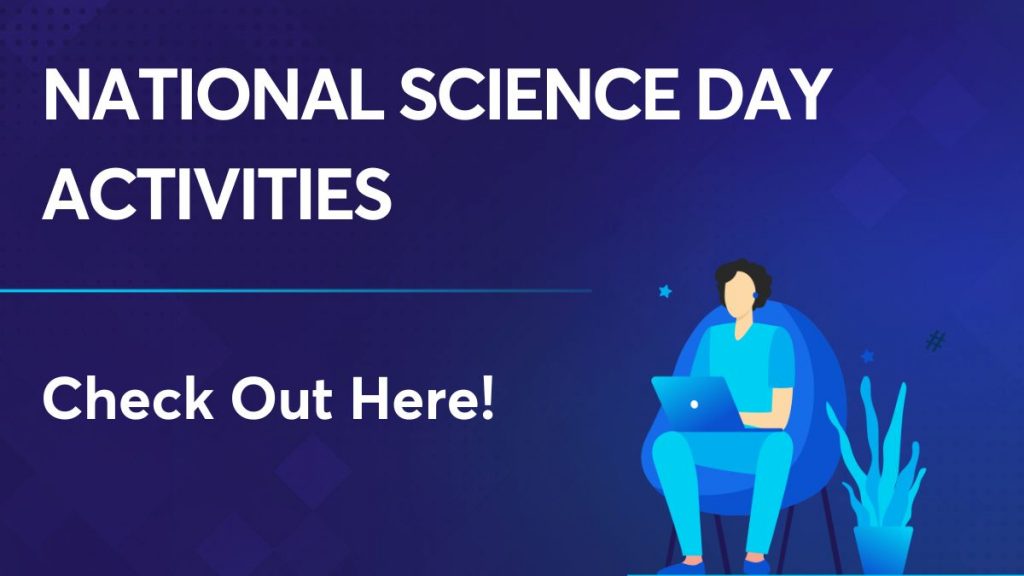National Science Day Activities: Since 2009, February 28 has been observed as National Science Day throughout India in remembrance of Dr. Chandrasekhara Venkata Raman (C V Raman), an Indian physicist who discovered the Raman Effect on that day in 1928. For this discovery, he received the Physics Nobel Prize in 1930. Every year, National Science Day is observed as one of the major science festivals in India, during which students from different schools and colleges present a wide range of science projects and national and state science institutes display their most recent investigations.
National Science Day Celebration in Schools
Schools are crucial in encouraging pupils to learn about science. National Science Day celebrations in schools are an excellent method to inspire kids to investigate scientific ideas and foster a scientific mindset.
Schools can host a variety of activities and events to commemorate the anniversary, including scientific fairs, quizzes, projects, and exhibitions.
The science display is one of the schools’ most popular activities on National Science Day. To demonstrate their scientific expertise and understanding, students might exhibit their creative scientific projects and models.
Another fun activity that assesses students’ scientific knowledge and aids in their acquisition of new knowledge is the science quiz. Schools can encourage students to pursue scientific inquiry by inviting renowned scientists and experts to give talks.
Check the latest updates below-
National Science Day Activities
Various activities are held where students from various schools and institutions can display their skills in the sciences. Several events are planned to commemorate this day in certain schools. Every year on February 28th, India observes National Science Day to honour Sir C.V. Raman, an Indian physicist who discovered the Raman Effect in 1928. The day’s purpose is to raise awareness of and appreciate the value of science and technology in our daily lives. Here are a few things you may do in honor of National Science Day:
- National Science Day Speech Competition: On this day, a lot of schools and colleges all over India hold inter-school or inter-college speaking competitions. National Science Day is a great chance to introduce science and technology to students. Topics for the speech contest are drawn from science, technology, or the newest developments in the nation’s technological industry.
- National Science Day Quiz Competition: Do you not believe that quizzes are the best way to broaden your understanding of science and technology? In the quiz tournament, numerous teams face off against one another in various rounds. As the progress of the game, the questions become more difficult. You are free to include questions on a variety of subjects, such as science, math, logical thinking, etc. if you are the host.
- National Science Day Essay Writing Competition: Compared to their vocal abilities, some pupils are excellent writers. So why not enter a contest for essays? That would be a great chance for students to expand their skill sets as well. Are you unsure of the subjects you can cover? As was previously said, essay contests should focus on science and technology. You can also write on notable Indian scientists, like the late Dr. A.P.J. Abdul Kalam, or discuss the newest developments in technology.
- Science Exhibition/ Science Fair: The greatest day to support eager pupils who want to show off their talent through science projects is thought to be today. They can create replicas of the numerous phenomena in nature and explain them to their peers and the audience in such an exhibition. Science fairs can bring together numerous science projects from different schools, showcasing them in one location and highlighting the value of science and technology to the kids.
- Science Debated: By simulating two sides of an argument, the debate may be the most effective technique to expand students’ understanding. Two teams shall compete against one another in the discussion, and each side must present logical, reasonable arguments, facts, and figures to demonstrate its position is correct.
Other National Science Day Activities
- Conducting essay competitions for students.
- Conducting quiz competitions.
- Nearby – Scientist Inviting Researchers and Research Agencies
- Demonstrate, present, and explain non-fiction science topics.
- Asking and pondering interesting science questions.
- Conducting oratory competitions.
- Science material
- Science experiment management
- Establish Class / Chapter Performance
- Conducting experiments where electricity is available
- Giving an item to a class and talking about it,
- Exhibition of Science Books.
- Talking about a scientist, his research, and their effects.
- Explaining some of the equipment
- Demonstration of science projects
- Demonstration of Popular Science
- Teaching material
- Maintaining knowledge.
- Watch the parents of the students and members of the community participate in the science fair
FAQs on National Science Day Activities
There are several activities that can be done on National Science Day such as science exhibitions, science experiments, science talks, science fairs, science movie screenings, science debates, science quiz contests, science exhibition competitions, and science and technology workshops.
National Science Day activities can be organized for people of all ages. Students, teachers, science enthusiasts, scientists, and the general public can participate in these activities.
National Science Day is celebrated to commemorate the discovery of the Raman Effect by Sir C.V. Raman, the Indian physicist, in 1928. It is a day to promote and celebrate the importance of science and technology in our daily lives.
National Science Day activities can benefit students in several ways. They can learn about different scientific concepts, technologies, and their practical applications. They can also showcase their scientific projects and inventions and learn from the projects of other students.
Certainly, there are numerous online activities for National Science Day, such as quizzes, virtual science exhibitions, webinars, and science games.
